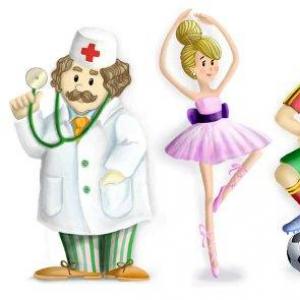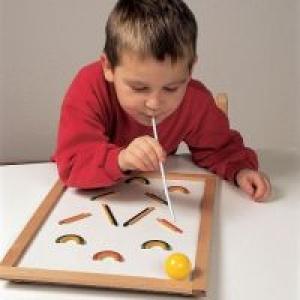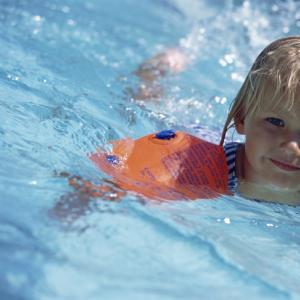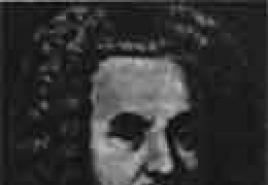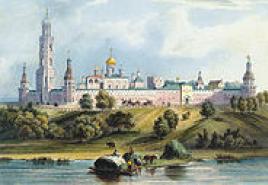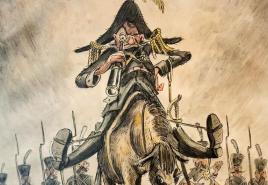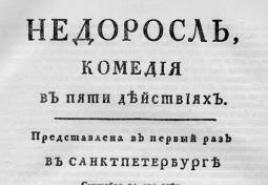We teach professions in English for children. Summary of an English lesson on the topic of profession
Go through the topic Professions? Are you preparing for a lesson on Professions? This means that the following exercises will be useful to you, thanks to which you will not only remember the names of professions in English, but also learn how to write descriptions of your (future) profession in English.
Before you start doing the exercises, read the following. Exercises for practicing professions are carried out in order of increasing difficulty. At the end you will find answers for self-test.
Exercises on professions. Exercises for children and beginners to learn English.
Exercise 1. Read the names of professions and circle the two professions that you like best.
- a doctor - doctor
- a nurse - nurse
- a driver - driver
- a worker - worker
- a builder - builder
- a seller
- an economist - economist
- an engineer - engineer
- a housewife - housewife
- a businessman - business man
- a military man - military man
Exercise 2. Match the two lists to make sentences describing certain jobs
|
|
Exercise 3. Listen to the names and say what these people were.
Example: Beethoven – a composer.
Exercise 4. a) Look at the list. Do you know all the words? Give the definitions.
a shop-assistant
a police officer
b) which of these are not actually professions (4)?
c) Underline the jobs you think are exciting.
Circle the jobs you would never like to do.
Put brackets around the well-paid jobs.
Cross out the jobs you think are boring.
Tick the jobs you think you'll be good at.
d) Which jobs from the list match these definitions?
- - a person who does experiments.
- — someone who works in the country with animals or plants.
- - a person who cooks in a restaurant.
- - a person who makes things from wood.
- - a person who helps a doctor in a hospital.
- — someone who does office work, such as typing letters, answering phone calls, etc.
e) Write 3 more definitions of the jobs people do. Work in groups. Can your classmates guess the jobs?
Exercise 5. Complete the sentences with the names of professions or activities.
A person who writes for newspapers is a journalist.
- A doctor who treats teeth is ...
- A person who paints pictures is ...
- A person who types papers is ...
- A person who takes part in public life is …
- A scientist who studies the structure of materials is ...
- A scientist who studies the structure of organisms is ...
- A person who writes books is ...
- A person who knows a lot about his job is ...
Exercise 6. Look through the list of circus jobs. Translate them and say which of them you like best and why.
Acrobat, clown, magician, tamer, ringmaster, horse-rider, fire-eater, manager, musician, weight lifter, jumper, dancer
Exercise 7. Write the names of five jobs that people do:
- inside the building,
- in the open air,
- with their hands,
- with the help of a computer,
- using a pen.
Exercise 8. Write the names of professions that are connected with the words.
Example: mark - teacher
Exercise 9. Build the names of jobs and professions from the given English words. Translation may help you to do it.
- build (builder) ____________
- music (musician) ____________
- employ (employer, employee) a) ____________b) ____________
- history (historian) ____________
- biology (biologist) ____________
- invent (inventor) ____________
- account (accountant) ____________
Exercise 10. Choose from the box gender-neutral names for the given professions.
Mail carrier, congressional representative, salesperson (2), bar person, police officer (2), flight attendant, chairperson, firefighter, business executive (2)
- Chairman _____________________
- Businessman _____________________
- Businesswoman _____________________
- Mailman _____________________
- Stewardess _____________________
- Policewoman _____________________
- Policeman _____________________
- Salesman _____________________
- Saleswoman _____________________
- Barman _____________________
- Fireman _____________________
- Congressman _____________________
Answers:
1 – f, 2 – k, 3 – e, 4 – m, 5 – b, 6 – c, 7 – i, 8 – g, 9 – h, 10 – a, 11 – d, 12 –l, 13 – j, 14 – p, 15 – o, 16 – n.
- poet / playwright / dramatist
- Scientist
- Presidents
- Singers
- Detectives
- Printer
- Sailors
- test pilots
- goalkeeper
B) a businessman, a housewife, a student, a traveler.
D) a) a scientist, b) a farmer, c) a chef, d) a carpenter, e) a nurse, f) a secretary
Possible answers:
1 a dentist, 2 a painter, 3 a typist, 4 a politician, 5 a chemist, 6 a biologist, 7 a writer, 8 a professional
Acrobat, clown, magician, animal trainer, ringmaster, equestrian, fire-eater, manager, musician, weightlifter, jumper, dancer
- builder 2. musician 3. a) employer; b) employee 4. historian 5. biologist 6. inventor 7. accountant
Answers:1. chairperson 2. business executive3. business executive 4. mail carrier 5. flight attendant 6. police officer 7. police officer 8. salesperson 9. salesperson 10. bar personII. firefighter 12. congressional representative
Municipal budgetary institution
additional education
Center for extracurricular activities "Harmony" in Tikhoretsk

Developed by:
additional education teacher
Belavina Vera Viktorovna
Tikhoretsk
Goal: creating conditions for the formation of knowledge about professions and their representatives.
1.Tell about what professions are, about the scope of various professions, name the various professions and their representatives, list the necessary working tools and the results of the work of each of the named professions.
2.Develop children's vocabulary and horizons.
3. Foster respect for representatives of various professions.
Material and technical support for the lesson: cards with images of professions, a set of demonstration material on the topic “Professions”, task cards on the topic “Collect a profession” and “Match and complete”.
During the classes:
Hello guys. Today in class we will talk to you about professions and their representatives. Tell me, what professions do you know?
Children name professions.
What professions do we encounter every day?
Children respond6 with sellers, with vehicle drivers, with teachers, etc.
Poem about professions
What does craft smell like? Gianni Rodari.
Everyone has something to do
Special smell:
The bakery smells
Dough and baking.
Past the carpenter's shop
You go to the workshop -
Smells like shavings
And a fresh board.
Smells like a painter
Turpentine and paint.
Smells like a glazier
Window putty.
Driver's jacket
Smells like gasoline.
Worker's blouse
Machine oil.
Smells like a pastry chef
Nutmeg.
Doctor in a robe-
A pleasant medicine.
loose earth,
Field and meadow
Smells like a peasant
Walking behind the plow.
Fish and sea
Smells like a fisherman.
Only a slacker
Doesn't smell at all.
No matter how much you smell
Rich loafer, -
Very unimportant
It smells, guys!
Guys, what do you think would happen if, for example, representatives of the “doctor” profession disappeared? (Children's answers). What if there were no cooks, teachers, etc.? (Children's answers). This means that we need and simply need representatives of all professions. There will be no gardeners - there will be no one to plant trees, there will be no bus drivers - we will have to walk to work, there will be no cleaners and janitors - everywhere will be so dirty that we will not be able to study and walk the streets calmly. Therefore, ALL PROFESSIONS ARE NEEDED, ALL PROFESSIONS ARE IMPORTANT! (Children repeat this phrase several times in chorus.)
Demonstration of pictures depicting various professions.
Children name professions, the teacher corrects if the child makes a mistake.
Working with demonstration material on the topic “Professions”.
Children, with the help of a teacher, first name a representative of the profession, then his tools, then what he does, then the result of his work.
Now, guys, let's check how well you know the professions.
Riddles on the theme “Professions”.
He is a very good master
He made a wardrobe for our hallway.
He is not a carpenter, not a painter.
Furniture is made... (carpenter)
Traffic rules
He knows without a doubt.
He instantly starts the engine,
The car is rushing... (driver)
Dark night, clear day
He fights fire.
In a helmet, like a glorious warrior,
Hurries to the fire... (firefighter)
He puts the bricks in a row,
Builds a kindergarten for the children
Not a miner or a driver,
He will build us a house... (builder)
Who is sailing on the ship
To an uncharted land?
He is cheerful and kind.
What's his name? (Sailor)
In reality, not in a dream
He flies on high.
Flying a plane in the sky.
Who is he, tell me? (Pilot)
You are probably familiar with him.
He knows about all the laws.
Not a judge, not a journalist.
He gives advice to everyone... (lawyer)
Stands at his post
He keeps order.
Strict, brave officer.
Who is he? (Policeman)
Nails, axes, saw,
There's a whole mountain of shavings.
This is a worker working -
He makes chairs for us... (carpenter)
He is away from all his relatives
Drives ships to sea.
Seen a lot of countries
Our brave... (captain)
So that an ambulance rushes across the bridge,
He is repairing at the bottom of the support.
All day long over and over again
Dives deep... (diver)
Who controls the movement?
Who lets cars through?
On the wide pavement
Waves his baton... (guard)
He is on duty in the snow and heat,
Protects our peace.
A man who is faithful to his oath,
Called... (military)
Knock flies from under the wheels,
An electric locomotive rushes into the distance.
The train is not driven by a taxi driver,
Not a pilot, but... (driver)
Performs stunts in films
Dives from a height to the bottom
Trained actor.
Fast, brave... (stuntman)
He waves a thin stick -
The choir on stage will sing.
Not a wizard, not a juggler.
Who is this? (Conductor).
Children’s independent work with task cards “Collect a profession” and “Match and complete.”
Children are given task cards where they need to assemble puzzles by profession and draw a line with a pencil connecting the profession and its representatives in the picture, or a set of tools, etc.
Learning proverbs and sayings about work and labor
You can’t even catch a fish from a pond without difficulty.
The master's work is afraid.
The eyes are afraid, but the hands are doing.
Time for business, time for fun.
Who does not work shall not eat.
Class: 2
Lesson topic: “What professions do we know?” (fragment for the district seminar on the topic “Professions”, 25 minutes).
The purpose of the lesson: systematize students’ knowledge on the topic “Professions”, develop knowledge in the field of oral and written speech on the topic.
Lesson objectives:
- Educational:
- updating knowledge, skills, acquired previously, formation and development of speech competencies;
- formation of grammatical skills in using verb forms to be V Present Simple, constructing affirmative, interrogative and negative sentences in the present simple tense based on vocabulary on a given topic;
- promote the formation of monologue and dialogic speech skills on the topic of the lesson;
- practicing phonetic skills;
- formation of spelling skills.
- Developmental:
- develop attention, memory, logical thinking, linguistic guesswork;
- development of students' communicative competence.
- Educational:
- instill love and interest in a foreign language;
- develop the ability to work in pairs and independently;
- cultivate a respectful attitude towards various types of professional activities.
Lesson type: lesson on the integrated application of students' knowledge of learning.
Types of speech activity: speaking, listening, reading and writing.
Equipment: multimedia projector, computer system unit, keyboard, mouse, multimedia presentation on the topic of the lesson, audio recording from the series “Songs for children in English” (disc “People and places”), thematic cards in English from the series “Professions.Hobbies”, cards "Claro" (Spectra equipment), illustrative visuals, magnets on the board.
DURING THE CLASSES
I. Organizing time. Greetings
Teacher: Good morning, boys and girls! Glad to see you.
Good morning, good morning, good morning to you,
Good morning, good morning I`m glad to see too.
Teacher: Today we have an unusual lesson; we have guests at our lesson. Turn around, please, and say “Hello!” all together. Smile to each other. Let's start. Today we shall speak about different professions. Dear friends, at first let`s do our exercises! (Children do exercises while looking at the screen (slides 1-4), on which 4 professions appear: students, farmer, policeman, teacher). The song “I went to school one morning” plays:
I went to school one morning
And I walked like this, Joyful students on the screen
Walked like this, walked like this. walking to school. Large
I went to school one morning inscription “Pupils”.
And I walked like this,
All on my way to school.I saw a little rabbit
And he hopped like this On the screen, a farmer is surrounded
Hopped like this, hopped like this. jumping rabbits. Large
I saw a little rabbit with the inscription “Farmer”.
And he hopped like this,
All on my way to school.I saw a tall policeman
And he stood like this,
Stood like this, stood like this. On the screen the policeman is adjusting
I saw a tall policeman moving. Large inscription
And he stood like this, “Policeman”
All on my way to school.I heard the school bell ringing
And I ran like this,
Ran like this, ran like this. On the screen there is a smiling teacher
I heard the school bell ringing and meets children on the threshold of the school.
And I ran like this, Children run to her from all sides.
All on my way to school. Large inscription "Teacher".
II. Phonetic exercise
Practicing the learned vocabulary on the topic “Professions” (slides 5-20). Pictures appear on the screen depicting people of various professions: doctor (a d octor), dancer (a d a ncer), astronaut (a c o smonaut), engineer (an en g ineer), driver (a dr i ver), worker (a w o rker), policeman (a pol i ceman)/policeman (a mili ti aman), farmer (a f ar mer), teacher (a t ea cher), fireman (a f ireman), postman (a p o stman), veterinarian (a v e t), pilot (a pilo t), student (a p u pil), programmer (a p rogrammer), cook (a c oo k).
Now, children, tell me please, what professions can you see on the screen? What is he or she? (Students name the proposed profession one by one, the teacher clicks the mouse, each word is checked on the screen. Then the students name each profession together. The teacher pays special attention to the highlighted sounds, drawing the children’s attention to them).
e.g.
Pupil: I think, he is a doctor.
Teacher: Let`s check it. O.K. Well done! Let`s train our Mr.Tongue: [d], [d], [d]. Doctor!
III. Speech warm-up
Children work in pairs (slide 21). According to the established pattern, the children compose dialogues about the professions of their parents and about themselves.
P1: What is your father?
P2: He is a worker.
P1: What is your mother?
P2: She is a doctor. And what about your parents?
P1: My father is a… What do you want to be?
P2: I want to be a pilot. And what about you?
P1: I want to be a…
IV. Checking homework
Working with Claro cards and performing self-tests. (The students were asked to prepare for a dictation on professions: a doctor, a worker, a pilot, a driver, a teacher, a vet, a cook). Students fill out the cards with markers, then independently check and correct mistakes).
– And now we have a test. Take your cards and fill up your cards, please. (Children fill in 7 words on the topic “Professions” with markers).
– Turn your cards. Check yourself. (Turn over the cards, check yourself).
– Who did the test right? Stand up! Excellent!
– Who has 1 or 2 mistakes? - Good.
– Who has more than two mistakes?
– I hope you will be better next time!
– Clean your cards!
V. Main stage
Task 1.Repetition of forms of the verb to be in the Present Simple.
– Fill in the blanks, please. (slide 22)
- My mother…a teacher.
- They... doctors. am
- She...a pupil.
- His father...a farmer. is
- Tom and Bob ... painters.
- I...a fireman.
- You...a baker. are
- Her sister… an engineer.
- My brother...a businessman.
- I...a pilot.
(By clicking, each link is displayed for checking after the student has read and translated the sentence, inserting a linking verb).
Task 2. Game “Who does Pancho-Karancho want to be?” (slide 23)
The teacher gives students colored cards with different professions: musician, teacher, policeman, programmer, pilot, builder, flight attendant, doctor, dancer, veterinarian, etc. (cards are distributed according to the number of students in the class).
– Now children, let`s play. Look at the screen, please. This man`s name is Pancho-Carancho. Try to guess what does he want to be? I think, he wants to be a clown.
Next, students who received cards with professions in random order express their versions according to the example on the slide:
Pancho-Carancho doesn`t want to be a … He wants to be a …
(Children assume their profession and post a card on the board: physical education + lexical and grammatical exercise). At the end of the game, the answer appears on the slide: Pancho-Carancho wants to be a musician. This fairy-tale character plays the saxophone.
Task 3. Game Unscramble the words (slide 24)
- heecatr – teacher These professions are depicted on 7
- corotd – doctor pictures on the right side. By
- rowker – worker click next to the anagram appears
- umocasont – cosmonaut is the correct word.
- eirengne – engineer
- liopt – pilot
- okoc-cook
Task 4. Match the words and the sentences (slide 25)
Now children your task is to match every word and the sentence correctly.
- a dentist a) He bakes bread.
- a doctor b) He takes care of our teeth.
- a teacher c) She gives pupils homework.
- a baker d) He drives a car.
- a driver e) He works at a hospital.
When children offer their versions of answers, the keys appear by clicking: 1 – b, 2 – e, 3 – c, 4 – a, 5 – d.
Task 5. Correct the mistakes (slide 26)
Boys and girls, tell me please, true or false.
- Doctors teach children.
- Dancers work in the hospital.
- A farmer works at a farm.
- Workers bake bread
- Teachers work at school.
After checking, the corrected sentences appear on click. In words where there was an error, the letters are located at an angle and are of a different color.
VI. The final stage
Summing up, grading, assignments.
- Guys, what did we talk about in class today? - About professions.
– Yes, today we have spoken about different professions. To be a doctor or a teacher depends on you. You should choose your profession wisely. It's up to you guys who you become. Study well and choose a profession you like. Good luck with your choice! Good luck!
– Now children open your notebooks and put down your homework, please (ex. 6, p. 64). Thank you very much for your work at the lesson. Come to me please to get your marks. The lesson is over. (Slide 27).
Children come up with diaries for grades, the song “Goodbye, little Friend!” is played.
Shelukhina Daria Mikhailovna
English teacher
Municipal Budgetary Educational Institution Lyceum No. 26
Topic: “Guess who they are?”
1 class
Extracurricular activities English.
Goals:
Creating conditions for children to develop interest in foreign language culture.
Ensuring maximum assistance in the development of the potential of the child’s personality and ability to think creatively.
Conducting classes in a playful way. Developing children's interest in English through play.
Getting to know the names of professions.
Let's study, playing- “Are you a doctor” Youdoctor?
Development of the ability at an elementary level to name the main professions.
We finish drawing the images and color them (developing attention and fine motor skills of the fingers).
Consolidation of lexical units on the topics “Professions”, “Counting 1-10”.
Progress of the lesson:
Greetings : (1 min.)
Teacher : Good morning(3 R.) to you! Children : Good morning(3 R.) to you!
Good morning my children Good morning (2R.)
I am glad to see you! I am glad to see you!
Inclusion attention (3 min .)
Teacher:Bell rings, the game begins ( ringsbell)
Stand up, hands up, hands down, hands on hits, bend left, bend right, clap your hands etc.
During this game, the teacher names the movements in any order, while the children make these movements, trying not to make mistakes.
Basis of the lesson (repetition of covered vocabulary and introduction of new ones)
Teacher: Today, guys, we will talk about important and necessary professions. Look at the screen and repeat the names of professions after Tim. (Images of professions appear on the screen, accompanied by the speaker’s pronunciation.)
Children: Doctor, dentist, pilot, sportsmen, photographer, actor, businessmen.
Teacher: Now guys, look at the screen, try to guess who is hidden in the picture?
Children: Doctor, dentist, pilot, sportsmen, photographer, actor, businessman.
Half pictures of professions appear on the screen; after the children guess the profession, the picture appears in full.
Are you a doctor ?»
During this game, one of the participants comes to the board, the teacher whispers to him the name of the profession, so that the other children do not hear anything. The driver at the board must depict the hidden word using facial expressions and gestures. The rest of the game participants try to guess one profession or another.
Examples questions : Are you a doctor/dentist/sportsmen/actor And T . d .
During this game, the teacher hands out sheets of paper with pre-drawn silhouettes of a person (1 per desk), and names a profession for each pair. Children should begin to draw a man of the profession that was named for him. After 10 seconds, the teacher rings the bell and students must pass their unfinished drawings to the other pair. The game continues until the sheets make a full circle.
Teacher: Now, let's play the game " Knock , knock ..." But before that, we need to remember some song that we learned earlier.
Children: “I’m Nick”, “How many?”« How old are you ?»
During this game, the driver goes out the door, and the rest hide the object in the classroom. Having entered the room, the driver begins to look for the hidden object, while the rest of the children sing a song, which either subsides or becomes louder when he is very close to the goal. This continues until the driver finds the item.
Summarizing:Teacher:Let's think about what professions we have met? The guys name their professions.
Teacher: Bring pencils and paper to the next lesson.
We say goodbye in unison :
Good bye (3 R.) my doll.
Good bye (3 R.) you all.
Bibliography:
- Songs for children in English. Games and Activities . Book for teachers / trans. N.S. Platonova. – M.: Iris-press, 2010. – 48 p. Video for repeating the song: http://www.youtube.com/watch?v=G3zaC5onBvM Images for the presentation are taken from the Internet.
Summary of a speech therapy lesson on the speech development of older preschoolers on the topic “Professions.” This work presents a variety of work techniques aimed at children’s learning to activate vocabulary on a given topic, the formation of grammatical categories, and coherent speech.
Goal: compiling a descriptive story based on a diagram.
Tasks :
- Activate, clarify and expand the vocabulary on this topic;
- Learn to use nouns in the instrumental case in speech;
- Develop the ability to form words denoting female professions with the suffix –its-, -nits-;
- Introduce children to the formation of complex words denoting professions;
- Develop higher mental functions;
- Foster interest and respect for people of different professions;
- Develop observation and curiosity.
Speech material:
- Nouns: cook, fireman, driver, teacher, educator, doctor, artist, policeman, syringe, thermometer, knife, ladle; brush, paints, whistle, wand, chimney sweep, lumberjack, digger, beekeeper, fisherman, singer, magician, translator, teacher, educator, artist, conductor.
- Verbs: teach, read, write, cook, cook, fry, manage, drive, cut, treat, give injections, measure temperature, chop, catch, shear, stew, sell, draw, build, manage.
Equipment: presentation, hats of representatives of various professions, tools.
Progress of the lesson
Organizing time.
Speech therapist: “Hello, children. My name is Victoria Konstantinovna, and today we will go to the City of Masters. This is a place where cheerful and hardworking people live. And what kind of people are you going to find out if you guess my riddles”:
Riddles about professions(activation of nominative vocabulary)
Tell me who is so delicious
Prepares cabbage soup,
Smelling cutlets, salads, vinaigrettes,
All breakfasts, lunches? (cook)
We get up very early
After all, our job is to transport everyone in the morning
To work. (driver)
We must fight fire
We are partners with water.
People really need us,
Answer quickly, who are we? (firemen)
Who is the most useful in days of illness?
And cures us of all diseases? (doctor)
Game "Who does what?"(activation of predicative vocabulary)
Speech therapist: “Well done guys! Residents of the City of Masters are happy to welcome you and want to know if you are well versed in the professions. Now I will name the person’s profession, and you, what can he do?”
What can a cook do?...cook, boil, fry;
What can a teacher do?...teach reading, writing;
What can a doctor do?...treat, give injections, set a thermometer;
What can an artist do?...draw;
What can a firefighter do?...put out a fire;
What can a builder do?...build houses;
What can a seller do?...sell goods;
What can a hairdresser do?...cuts hair, does hair;
What can a driver do?...drive a car;
What can a motorcyclist do?...drive a motorcycle;
What can a pilot do?...fly an airplane;
What can a policeman do?...control the movement of cars, protect people;
What can a pianist do?...plays the piano;
What can the guitarist do?...plays the guitar.
Game "Who will you be?"
Speech therapist: “Residents of the city of masters invite us to become residents of the city ourselves. Do you agree? Then now you and I will turn into people of different professions, but for this we need to close our eyes (the speech therapist puts hats of representatives of different professions on the children). Guys, open your eyes."
You're wearing a builder's helmet, what have you become? A builder.
You're wearing a chef's hat, what have you become? Cook.
You're wearing an artist's hat, what have you become? An artist.
You're wearing a doctor's cap, what have you become? A doctor.
You're wearing a policeman's cap, what have you become? To the police.
Game "Find the tool".
Speech therapist: “Guys, tell me, do we have everything we need for work or what is missing? Of course, we lack tools. Look, in my box there are tools for different professions. Now you take turns choosing the one you need and tell me what you will work with.”
I will work... with a syringe, a thermometer; knife, ladle; brush, paints; whistle, baton.
Speech therapist: “Well done, guys! Now you are real residents of the City of Masters. Tell me, what do people of other professions use in their work? What does a hairdresser, salesman, teacher, janitor, tailor/seamstress do?”
Fizminutka.
Speech therapist: “Now guys, stand in a circle. Watch and follow my steps."
Come on, pilots, pilots,
We got ready for the flight.
They approached the plane
And they went up the ladder.
The flight begins.
Our plane buzzed.
He rose up and flew.
The pilot looked to the right,
The pilot looked to the left.
Flew quickly forward
Our mail plane.
“Create a profession”.
Speech therapist: “Guys, look, the city residents are asking us to help them. They say that there are enough professions for all the residents, but no one knows what to call their profession. Let’s help them and come up with a name for the profession.”
This man is fishing, who is he? Fisherman.
And he’s cutting down this forest, who is he? Lumberjack
Who is this guy cleaning the pipes? Chimney sweep
And this one is digging the ground, who is he? Digger.
And this guy breeds bees, who is he? Beekeeper.
Thank you guys, now we have professions.
Game "Craftswomen".
Speech therapist: “And there are many craftswomen living in our city. What should we call their professions?
He is a singer, and she is... a singer;
He is a pilot, and she is... a pilot;
He is an artist, and she is... an artist;
He is a teacher, and she is... a teacher;
He is a writer, and she is... a writer;
He is a teacher, and she is... a teacher;
He is a conductor, and she is... a conductor;
He is a translator, and she is a translator;
He is a magician, and she is... a magician.
Game “Tell me about your profession”.
Speech therapist: “Now let’s each tell you about the profession that he received in the City of Masters. And this diagram will help you."
Children take turns writing a descriptive story about their profession based on the plan:
- Name your profession.
- What does a person in this profession do?
- What does it do?
- Where he works?
Summary of the lesson.
Speech therapist: “Our journey has come to an end. Tell me, did you like it in the City of Masters? Remember, who lives there?”
Differentiated assessment of children's answers.
Besedina Victoria Konstantinovna,
teacher speech therapist,
GBDOU Kindergarten No. 1238,
Moscow

